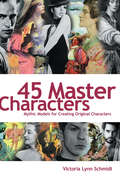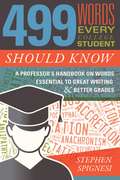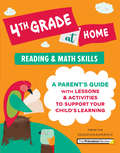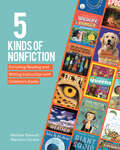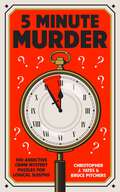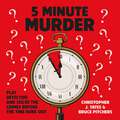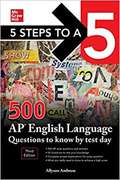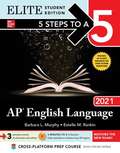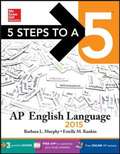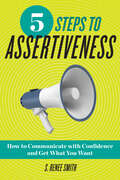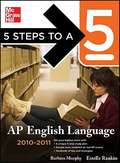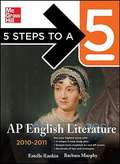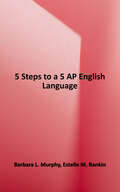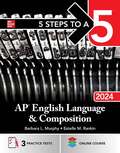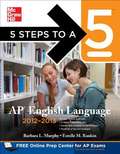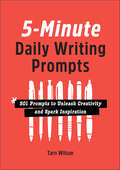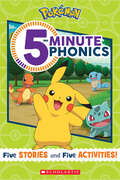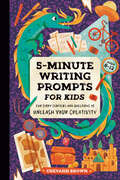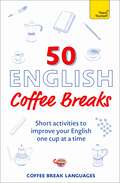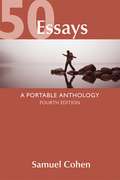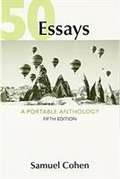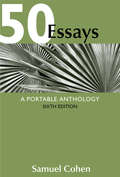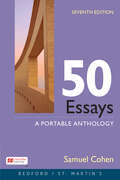- Table View
- List View
45 Master Characters: Mythic Models For Creating Original Characters
by Victoria SchmidtCreate unforgettable characters your readers will love! 45 Master Characterswill make your characters and their stories more compelling, complex and original than ever before. You'll explore the most common male and female archetypes#151;the mythic, cross-cultural models from which all characters originate#151;and learn how to use them as foundations for your own unique characters. Examples culled from literature, television and film illustrate just how memorable and effective these archetypes can be#151;from "Gladiators" and "Kings" like Rocky Balboa and Captain Ahab to "Amazons" and "Maidens" like Xena and Guinevere. The mythic journeys of heroes and heroines#151;the progression of events upon which each archetype's character arc develops#151;are also examined. Building such a "journey" into your character's story will enable you to stop worrying about what happens next and get on with telling your tale. It's a power-packed method for creating characters that stand the test of time!
499 Words Every College Student Should Know: A Professor's Handbook on Words Essential to Great Writing & Better Grades
by Stephen SpignesiWords equal credibility. The more articulate a person is, the more seriously they will be taken?by everyone.On any given day, you might read ?abrogate” used in a USA Today article; or ?demagogue” or ?fiduciary” used on CNN. You might hear ?ensorcelled” and ?torpor” in a TV drama; you’ll hear a political candidate described as ?truculent.” You may hear ?pedantic” used in a movie. How many of these words are part of most college students’ ?arsenal of words”? Hopefully all of them, but if not, 499 Words Every College Student Should Know will provide them with what they need to become more articulate in their speaking and writing. It will also enhance their comprehension in their reading, ultimately culminating in what every student aspires to: earning better grades!499 Words Every College Student Should Know teaches truly important vocabulary words and focuses on Professor Spignesi’s classroom-tested Trinity of Vocabulary Use. For each word, the vocabulary-enriched and educated student will be able to:Understand the word in their readingUse the word in their speakingMake good use of the word in their writingUsing easy-to-understand, informative, and often humorous explanations of every word, 499 Words Every College Student Should Know also explores how to use the words in sentences, and in proper context. The majority of these words were individually chosen because they are fairly commonplace in media, books, online, and elsewhere, and students need to be able to understand them. Knowing them ? in fact, using the words and making them part of their everyday language ? will make any college student or those soon-to-be, more credible.
4th Grade at Home: A Parent's Guide with Lessons & Activities to Support Your Child's Learning (Math & Reading Skills) (Learn at Home)
by The Princeton ReviewLearn at home with help from the education experts at The Princeton Review! 4TH GRADE AT HOME provides simple, guided lessons and activities that parents can use to help keep 4th graders on track this year.Anxious about remote learning and hybrid schooling? Worried that the unique circumstances around coronavirus and education might keep your child from getting the help they need in class this year? Want to help support your child's schooling, but not sure where to start?You're not alone! 4TH GRADE AT HOME is a parent guide to supporting your child's learning, with help you can undertake from home. It provides: · Guided help for key 4th grade reading and math topics· Skills broken into short, easy-to-accomplish lessons· Explanations for parents, plus independent question sets for kids· Fun at-home learning activities for each skill that use common household items· Parent tips, review sections, and challenge activities seeded throughout the bookThe perfect mix of parent guidance, practical lessons, and hands-on activities to keep kids engaged and up-to-date, 4TH GRADE AT HOME covers key grade-appropriate topics including:· reading comprehension · context, main ideas, and details· plot and setting· cause and effect· addition and subtraction· multiplication and division· fractions and decimals· shapes, symmetry, and patterns· probability... and more!
5 Kinds of Nonfiction: Enriching Reading and Writing Instruction with Children's Books
by Melissa Stewart Marlene CorreiaOnce upon a time...children's nonfiction books were stodgy, concise, and not very kid friendly. Most were text heavy, with just a few scattered images decorating the content and meaning, rather than enhancing it. Over the last 20 years, children's nonfiction has evolved into a new breed of visually dynamic and engaging texts.In 5 Kinds of Nonfiction: Enriching Reading and Writing Instruction with Children's Books , Melissa Stewart and Dr. Marlene Correia present a new way to sort nonfiction into five major categories and show how doing so can help teachers and librarians build stronger readers and writers. Along the way, they: Introduce the 5 kinds of nonfiction: Active, Browseable, Traditional, Expository Literature, and Narrative -;and explore each category through discussions, classroom examples, and insights from leading children's book authorsOffer tips for building strong, diverse classroom texts and library collectionsProvide more than 20 activities to enhance literacy instructionInclude innovative strategies for sharing and celebrating nonfiction with students.With more than 150 exemplary nonfiction book recommendations and Stewart and Correia's extensive knowledge of literacy instruction, 5 Kinds of Nonfiction will elevate your understanding of nonfiction in ways that speak specifically to the info-kids in your classrooms, but will inspire all readers and writers.
5 Minute Murder: 100 addictive crime mystery puzzles for logical sleuths
by Christopher J. Yates Bruce PitchersA SLEUTHING EXPERIENCE THAT'S PERFECT FOR ALL PUZZLE AND WHODUNNIT LOVERS...The murderers have committed the crimes, now it's up to you to solve them. Using your powers of deduction, can you play detective and help put the killers behind bars? 5 Minute Murder features 100 logic and code-based murder-mystery puzzles, skillfully compiled by acclaimed psychological thriller writer Christopher J. Yates and puzzle expert Bruce Pitchers. From the dreaming spires of Oxford to the gritty streets of New York, this puzzle-meets-fiction book is split into 10 short stories, each with their own scintillating plotline to accompany the murder-based puzzles.If you're an armchair detective with a 5-minute coffee break to spare, can you crack the case?Praise for the work of Christopher J. Yates: "A new Stephen King, albeit with a British accent." - New York Post
5 Minute Murder: 100 addictive crime mystery puzzles for logical sleuths
by Christopher J. Yates Bruce PitchersA SLEUTHING EXPERIENCE THAT'S PERFECT FOR ALL PUZZLE AND WHODUNNIT LOVERS...The murderers have committed the crimes, now it's up to you to solve them. Using your powers of deduction, can you play detective and help put the killers behind bars? 5 Minute Murder features 100 logic and code-based murder-mystery puzzles, skillfully compiled by acclaimed psychological thriller writer Christopher J. Yates and puzzle expert Bruce Pitchers. From the dreaming spires of Oxford to the gritty streets of New York, this puzzle-meets-fiction book is split into 10 short stories, each with their own scintillating plotline to accompany the murder-based puzzles.If you're an armchair detective with a 5-minute coffee break to spare, can you crack the case?Praise for the work of Christopher J. Yates: "A new Stephen King, albeit with a British accent." - New York Post
5 Minute Murder: Interactive audio murder mysteries for puzzle and whodunnit fans
by Christopher J. Yates Bruce PitchersA SLEUTHING EXPERIENCE THAT'S PERFECT FOR ALL PUZZLE AND WHODUNNIT LOVERS...The murderers have committed the crimes, now it's up to you to put in the time to solve each of the heinous homicides. Using your logical powers of deduction, can you play detective and help put the killers behind bars?Experience 10 interactive murder mystery scenarios for puzzlers of all abilities, skillfully compiled by acclaimed US psychological thriller writer Christopher J. Yates and puzzle expert Bruce Pitchers. Become a Sheriff in the Wild West on the hunt for his varmint criminals or an amateur sleuth in Dickensian London using your immense intellect to deduce the perpetrators. These storylines, set in locations such as the dreaming spires of Oxford University, a space-age future and the gritty streets of New York, will put your investigative skills to the test. 5 Minute Murder combines logic problems and code-cracking with crime-writing to create a unique sleuthing experience. If you're an armchair detective, sit back and listen to the case files, make a note of any clues, and try and crack the case. Just don't make your answer a stab in the dark!Praise for the work of Christopher J. Yates: "A new Stephen King, albeit with a British accent." - New York Post
5 Steps To A 5: 500 Ap English Language Questions To Know By Test Day
by Allyson Ambrose500 ways to achieve your highest score From Autobiographers and Diarists to 20th Century Literature―there is a lot of subject matter to know if you want to succeed on your AP English Language exam. That’s why we’ve selected these 500 AP-style questions and answers that cover all topics found on this exam. The targeted questions will prepare you for what you’ll see on test day, help you study more effectively, and use your review time wisely to achieve your best score. Each question includes a concise, easy-to-follow explanation in the answer key. You can use these questions to supplement your overall AP English Language preparation or run them shortly before the test. Either way, 5 Steps to a 5: 500 AP English Language Questions will get you closer to achieving the score you want on test day.
5 Steps To A 5: AP English Language 2021 Elite Student Edition
by Barbara L. Murphy Estelle M. RankinThe immensely popular 5 Steps to a 5 AP English Language Elite Student Edition has been updated for the 2020-21 school year and now contains: 3 full-length practice exams (available both in the book and online) that reflect the latest exam, “5 Minutes to a 5” section ― a 5-minute activity for each day of the school year that reinforces the most important concepts covered in class, Up-to-Date Resources for COVID 19 Exam Disruption, Access to a robust online platform, Hundreds of practice exercises with thorough answer explanations, Strategies for deconstructing essay prompts and planning your essay, Powerful analytics you can use to assess your test readiness, Flashcards, games, social media support, and more.
5 Steps to A 5: AP English Language
by Barbara L. Murphy Estelle M. RankinThis book features an effective, 5-step plan to guide your preparation program and help you build the skills, knowledge, and test-taking confidence you need to succeed.
5 Steps to Assertiveness: How to Communicate with Confidence and Get What You Want
by S. Renee Smith5 Steps to Assertiveness is the modern how-to guide to communicate with assertiveness and build stronger relationships in today's world. Assertiveness goes beyond standing up for yourself. Assertiveness is saying what you want in a way that makes others want to listen. This philosophy is at the heart of the self-development method created by nationally recognized self-esteem and communication expert S. Renee Smith. In 5 Steps to Assertiveness, the nationally recognized self-esteem and communication expert distills what she's learned and taught about assertiveness over the past 20 years into 5 easy-to-follow steps. Built on her successful engagement with hundreds of organizations and individual clients, S. Renee has curated this actionable 5-step how-to guide that will help you see the value of what you have to say— and gain the confidence to say it. 5 Steps to Assertiveness is the most current guide to persuasive communication, and includes: A 5-step assertiveness action plan to help you understand your communication style and identify changes you can make that will lead to greater assertiveness An overview of the 4 different communication styles and the benefits and challenges of changing yours Practical exercises and examples that lead to real-world assertiveness in personal and professional situations When you communicate with assertiveness, you control where you go, how far you go, and the shape you're in when you get there. With 5 Steps to Assertiveness, the power is in your hands.
5 Steps to a 5 AP English Language, 2010-2011 Edition
by Estelle Rankin Barbara MurphyThis easy-to-follow guide offers students a complete review of the AP English Language course, strategies to give them the edge on test day, and plenty of practice with AP-style test questions. This guide comes complete with full-length practice tests and three customized study schedules.
5 Steps to a 5 AP English Literature, 2010-2011 Edition
by Estelle Rankin Barbara MurphyOffering students a complete review of their AP course, this easy-to-follow guide provides strategies to give them the edge on test day, and plenty of practice with AP-style test questions. Includes full-length practice exams modeled on the real test.
5 Steps to a 5: AP English Language 2022
by Barbara L. Murphy Estelle M. RankinLet us supplement your AP classroom experience with this multi-platform study guide. <p><p>The immensely popular 5 Steps to a 5 AP English Language guide has been updated for the 2021-22 school year and now contains: <p>• 3 full-length practice exams (available in the book and online) that reflect the latest exam <p>• Access to a robust online platform <p>• Hundreds of practice exercises with thorough answer explanations <p>• Strategies for deconstructing essay prompts and planning your essay <p>• Powerful analytics you can use to assess your test readiness <p>• Flashcards, games, social media support, and more
5 Steps to a 5: AP English Language and Composition 2024
by Barbara L. Murphy Estelle M. RankinReady to succeed in your AP course and ace your exam? Our 5 Steps to a 5 guides explain the tough stuff, offer tons of practice and explanations, and help you make the most efficient use of your study time. 5 Steps to a 5: English Language and Composition is more than a review guide, it’s a system that has helped thousands of students walk into test day feeling prepared and confident.
5 Steps to a 5: AP English Language, 2012-2013 Edition
by Barbara L. Murphy Estelle M. RankinThis book is designed to serve many purposes. It will: -clarify requirements for the AP English Language and Composition exam; -provide you with test practice; -show you models and rubrics on which you can model and evaluate your own work; -anticipate and answer your questions; -enrich your understanding and appreciation of the writing process; -help you pace yourself; and -make you aware of the Five Steps to Mastering the AP English Language and Composition exam.
5-Minute Daily Writing Prompts: 501 Prompts to Unleash Creativity and Spark Inspiration
by Tarn WilsonBecome a better writer in 5 minutes a dayWriting regularly is the best way to boost your skills and stay inspired—and this book of creative writing prompts is here to help you out! Spark your creativity with 501 short, simple prompts that encourage you to imagine, create, and improve.Just 5 minutes—The exercises in this daily writing prompt journal are quick and easy to do so you can always carve out a bit of writing time, no matter what else is going on in your life.Let go of the rules—Open-ended prompts offer just enough guidance to get you started as you practice generating fresh ideas, creative thinking, and releasing perfectionism.A mix of prompts—From a love poem to a sci-fi adventure and dialogue between kids, you'll get a chance to work with an array of genres, topics, and styles.Continue the story—Each writing activity includes an optional extra prompt that lets you expand what you wrote into something even more detailed and unique.Spark something new and build confidence in your writing this collection of 501 writing prompts!
5-Minute Phonics (Pokémon)
by ScholasticMake every minute of reading count! Kids and parents can join Ash, Pikachu, and all their favorite Pokemon in this fun, read-together phonics adventure. Includes five stories and five activities.The Science of Reading research proves that systematic phonics instruction is the most effective way to teach kids to read. Now caregivers can support these essential phonics skills with simple, engaging stories featuring their favorite Pokemon characters in just five minutes a day.This motivating compilation of simple stories makes it fun and easy to reinforce must-know phonics skills. Read each story together, sound out the highlighted words, then complete the simple activity.
5-Minute Writing Prompts for Kids: Fun Story Starters and Questions to Unleash Your Creativity
by Chevahn BrownThe ultimate guide to sparking your child&’s imagination and honing their creative writing skills, five minutes at a time!Is your child full of creativity but intimidated by the blank page? Do they need a little encouragement to dive into storytelling? With more than 150 writing prompts spanning five exciting genres—fiction, mystery, memoir, fantasy, and sci-fi—5-Minute Writing Prompts for Kids is perfect for readers ages 8–12 to explore the world of words through their own imagination. What kids will love about this book: Creative and engaging prompts: From fantastical quests to robot pets, each prompt invites new ideas and boundless creativity, exploring the realms of fantasy, mystery, autobiography, and more! Prompt &“twists&” challenge young writers to take their story further or view them from a new angle.Skill-building tips: Easy-to-follow content on character, setting, and other storytelling elements will help your child craft memorable narratives.Fun five-minute challenge: With no pressure to write beyond five minutes (though many kids will write for longer!), this book is an ideal gift for children with shorter attention spans, offering them an engaging activity that encourages creativity away from screens.Whether used at home or in school, 5-Minute Writing Prompts for Kids is sure to be a source of fun and inspiration for your future famous author. Ready, set, write!
50 English Coffee Breaks: Short activities to improve your English one cup at a time (50 Coffee Breaks Series)
by Coffee Break LanguagesTransform your down time into 'do time'.The most successful language learners create a habit of studying a little bit, often. With 50 English Coffee Breaks, you can easily improve your English by combining it with your relaxing daily coffee - from a 5-minute espresso to a 15-minute latte.Organised by 5, 10 and 15 minutes, these 50 varied and lively activities - from anagrams and idiom challenges to recipes and quotations - are created for high-beginner to intermediate adult and young-adult learners. The activities are carefully designed to keep you motivated and build your skills in key areas.· Reading comprehension· Writing skills· Grammar confidence· Phrasal verbs practice · Vocabulary development· Cultural awarenessBy practising English in a fun and relaxed way - in the time you have - you will find time to achieve your language-learning goals. So, pick up your preferred drink and this practical book. Soon, studying English will be the most pleasant and productive part of your busy day.For 15 years Coffee Break Languages has helped millions of people to learn a language in a way that fits into their everyday life: while walking the dog, working out at the gym, or on their coffee break!Teach Yourself has collaborated with Coffee Break Languages to bring their brilliant method to a wider audience by producing their first-ever printed product. All the activities are written by long-time English teachers in Coffee Break's characteristically friendly and conversational style. It's the perfect complement to your studies.The activities are levelled for high-beginner to low-intermediate learners: CEFR A2-B1 and ACTFL Intermediate-low/mid
50 English Coffee Breaks: Short activities to improve your English one cup at a time (50 Coffee Breaks Series)
by Coffee Break LanguagesTransform your down time into 'do time'.The most successful language learners create a habit of studying a little bit, often. With 50 English Coffee Breaks, you can easily improve your English by combining it with your relaxing daily coffee - from a 5-minute espresso to a 15-minute latte.Organised by 5, 10 and 15 minutes, these 50 varied and lively activities - from anagrams and idiom challenges to recipes and quotations - are created for high-beginner to intermediate adult and young-adult learners. The activities are carefully designed to keep you motivated and build your skills in key areas.· Reading comprehension· Writing skills· Grammar confidence· Phrasal verbs practice · Vocabulary development· Cultural awarenessBy practising English in a fun and relaxed way - in the time you have - you will find time to achieve your language-learning goals. So, pick up your preferred drink and this practical book. Soon, studying English will be the most pleasant and productive part of your busy day.For 15 years Coffee Break Languages has helped millions of people to learn a language in a way that fits into their everyday life: while walking the dog, working out at the gym, or on their coffee break!Teach Yourself has collaborated with Coffee Break Languages to bring their brilliant method to a wider audience by producing their first-ever printed product. All the activities are written by long-time English teachers in Coffee Break's characteristically friendly and conversational style. It's the perfect complement to your studies.The activities are levelled for high-beginner to low-intermediate learners: CEFR A2-B1 and ACTFL Intermediate-low/mid
50 Essays: A Portable Anthology
by Samuel CohenA collection of classic and diverse essays, with a variety of genres; to help the readers practice their reading, thinking and writing skills.
50 Essays: A Portable Anthology
by Samuel Cohen50 Essays: A Portable Anthology is the best-selling value-priced reader in the country because its virtues don't stop at the price. The book's carefully chosen selections include both classic essays and high-interest, high-quality contemporary readings to truly engage students. The editorial apparatus is flexible and unobtrusive enough to support a variety of approaches to teaching composition. In its fifth edition, 50 Essays continues to help students acquire the critical thinking and academic writing skills they need to succeed, without making a dent in their wallets.
50 Essays: A Portable Anthology
by Samuel Cohen50 Essays: A Portable Anthology is a bestselling value-priced reader because its virtues don't stop at the price. The book’s carefully chosen selections engage students and include both classic essays and high-interest, contemporary readings. The editorial apparatus is flexible and unobtrusive enough to support a variety of approaches to teaching composition. The sixth edition features new voices on culturally relevant topics as well as sentence guides that help students develop an academic writing voice with templates for a variety of composing situations.
50 Essays: A Portable Anthology
by Samuel CohenBrief, inexpensive, yet wide-ranging, this acclaimed collection includes a whole semester’s worth of thought-provoking reading.
